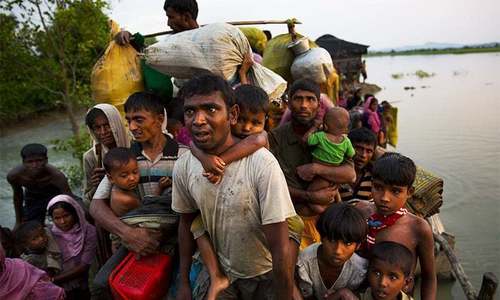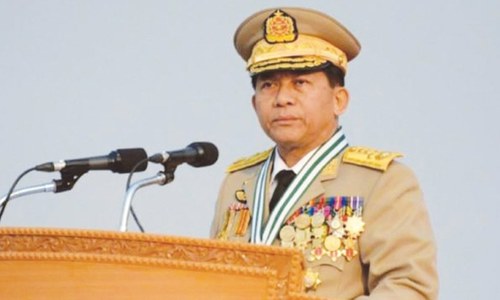Myanmar's army will court-martial soldiers after a new finding in an inquiry into atrocities in Rakhine state, from which more than 730,000 Rohingya Muslims fled a 2017 army-led campaign the United Nations says was executed with “genocidal intent”.
On Saturday, the website of Commander-in-Chief Min Aung Hlaing said a military court that visited the northern state found soldiers had shown “weakness in following instructions in some incidents” at a village said to have been a Rohingya massacre site.
In 2018, the Associated Press news agency reported the existence of at least five graves of Rohingya in the village, Gutarpyin, in the township of Buthidaung.
But government officials at the time said 19 “terrorists” had died and their bodies were “carefully buried”.
On Sunday, military spokesman Tun Tun Nyi told Reuters the investigation's findings were secret.
“We don't have the right to know about it,” he said by telephone. “They will release another statement about it when the procedure is finished.”
The court, comprising a major-general and two colonels, was formed in March to respond to accusations of mass killings, rape and arson by the security forces made by the UN and rights groups Amnesty International and Human Rights Watch.
It visited Rakhine twice in July and August.
Myanmar forces had launched their offensive in Rakhine in response to a series of attacks by Rohingya insurgents on security posts near the Bangladesh border.
Last year, a UN fact-finding mission said the military campaign was orchestrated with “genocidal intent”, and recommended charging Min Aung Hlaing and five other generals with the “gravest crimes under international law”.
Myanmar has denied the accusations, although Min Aung Hlaing said last month a number of security men may have been involved.
A previous military investigation in 2017 exonerated the security forces of any crimes.
Myanmar is facing growing international calls for accountability over the Rakhine campaign.
The International Criminal Court has opened a preliminary examination into the violence, while a panel formed by Myanmar that includes Philippine diplomat Rosario Manalo and Japan's former UN envoy, Kenzo Oshima, is due to publish its findings.
Internet shutdown lifted partially
The government has partially lifted a months-long internet shutdown in two western states where government troops are battling ethnic insurgents, a leading telecoms operator said on Sunday, amid peace talks seeking to end the fighting.
Norwegian mobile operator Telenor Group said the transport and communications ministry had lifted the block, in place since June 21, in five townships in Rakhine and Chin states at midnight.
Officials cited a “restoration of peace and stability” in the areas, Telenor said in a statement.
“Freedom of expression through access to telecoms services should be maintained for humanitarian purposes, especially during times of conflict,” it added.
Ministry officials did not immediately answer telephone calls to seek comment.
Rakhine state drew global attention after about 730,000 Rohingya Muslims fled to neighbouring Bangladesh in 2017, following a military crackdown in response to militant attacks.
More recently, civilians have been caught in clashes between the military and the Abakan Army, an insurgent group that recruits from the mainly Buddhist ethnic Rakhine population in its fight for greater autonomy for the state.
Since November, the fighting has displaced tens of thousands of people across a larger part of central and northern Rakhine and part of neighbouring Chin, the UN Office for the Coordination of Humanitarian Affairs says.
Much of the region is off-limits to journalists and most humanitarian agencies.
Tun Aung Kyaw, a secretary of Rakhine's biggest political party, the Arakan National Party, said the internet shutdown had been lifted in the four Rakhine townships of Buthidaung, Maungdaw, Rathedaung, and Myebon, and one in Chin state.
The fighting is the fiercest in the four Rakhine townships where the internet remains blocked, which are Ponnagyun, Mrauk-U, Kyuakdaw and Minbya, he told Reuters by telephone.
“The internet restoration could be due to peace talks between the military and ethnic armed groups,” he said. “We hope for the success of the peace talks and immediate restoration of the internet to the rest of the townships.”
The government has recently been holding peace talks with several armed groups, including the AA, which also participated in a massive assault on a military academy and police outposts in northern Myanmar last month.














































